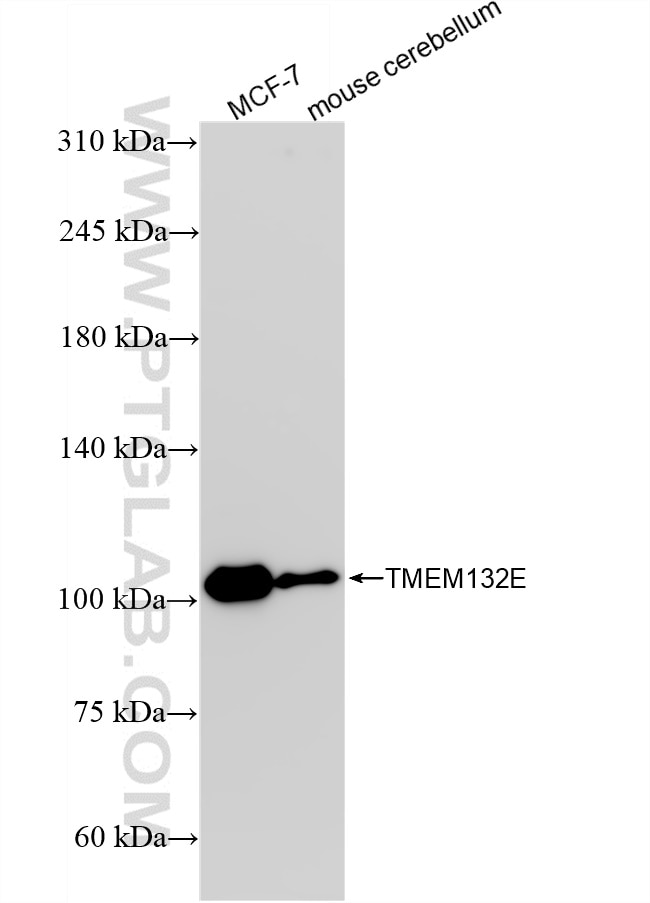TMEM132E Recombinant antibody
TMEM132E Recombinant Antibody for WB, ELISA
Host / Isotype
Rabbit / IgG
Reactivity
human, mouse
Applications
WB, ELISA
Conjugate
Unconjugated
CloneNo.
230525E12
Cat no : 82983-2-RR
Synonyms
Validation Data Gallery
Tested Applications
| Positive WB detected in | MCF-7 cells, mouse cerebellum tissue |
Recommended dilution
| Application | Dilution |
|---|---|
| Western Blot (WB) | WB : 1:1000-1:4000 |
| It is recommended that this reagent should be titrated in each testing system to obtain optimal results. | |
| Sample-dependent, Check data in validation data gallery. | |
Product Information
82983-2-RR targets TMEM132E in WB, ELISA applications and shows reactivity with human, mouse samples.
| Tested Reactivity | human, mouse |
| Host / Isotype | Rabbit / IgG |
| Class | Recombinant |
| Type | Antibody |
| Immunogen | TMEM132E fusion protein Ag26772 相同性解析による交差性が予測される生物種 |
| Full Name | transmembrane protein 132E |
| Calculated molecular weight | 116 kDa |
| Observed molecular weight | 100-110 kDa |
| GenBank accession number | NM_001304438 |
| Gene symbol | TMEM132E |
| Gene ID (NCBI) | 124842 |
| RRID | AB_3670733 |
| Conjugate | Unconjugated |
| Form | Liquid |
| Purification Method | Protein A purification |
| Storage Buffer | PBS with 0.02% sodium azide and 50% glycerol pH 7.3. |
| Storage Conditions | Store at -20°C. Stable for one year after shipment. Aliquoting is unnecessary for -20oC storage. |
Background Information
Transmembrane protein 132E (TMEM132E) is a member of the TMEM132 family which also include TMEM132A, TMEM132B, TMEM132C, TMEM132D (PMID: 29088312). The gene of TMEM132E is located within the DFNB99 locus on chromosome 17q12 and is highly expressed in the inner ear and other tissues including brain, kidney, lung, liver, spleen, heart, small intestine, colon, thymus, and stomach (PMID: 31656313). A variant of TMEM132E has been associated with autosomal-recessive nonsyndromic hearing loss DFNB99 (PMID: 25331638).
Protocols
| Product Specific Protocols | |
|---|---|
| WB protocol for TMEM132E antibody 82983-2-RR | Download protocol |
| Standard Protocols | |
|---|---|
| Click here to view our Standard Protocols |



